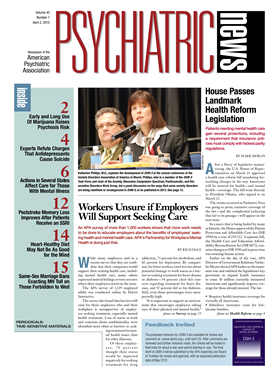Mental health leaders challenged the assertion that antidepressant use causes suicide among veterans and members of the military during a congressional hearing on the rising suicide rate among troops. And some warned that such allegations could lead service members and veterans to avoid needed care for depression.
The concern over links between suicide and the use of prescribed antidepressants was raised by witnesses during testimony at a hearing of the House Veterans' Affairs Committee in February.
Peter Breggin, M.D., a New York psychiatrist, told the panel that he has concluded from his research and that of others that SSRIs and other antidepressants cause suicidality and aggression. Especially at risk for “antidepressant-induced suicidality,” he said, are young adults aged 18 to 24, which is the age range of many active-duty members of the military.
“There is a strong probability that increasing suicide and violence rates among active-duty soldiers are in part caused or exacerbated by the widespread prescription of antidepressant medication,” Breggin said.
His claims were rebutted by several other witnesses, including Annelle Primm, M.D., M.P.H., APA deputy medical director and head of the Office of Minority and National Affairs.
“Contrary to frequent reports in the popular media, there is no evidence to suggest these medications increase the risk of actual suicide,” Primm emphasized.
On the contrary, she said, the research data indicate that people taking prescribed antidepressants are more likely to tell others about any suicidal thoughts or about previously unknown suicide attempts. That perspective was reinforced by a 2004 Food and Drug Administration (FDA) review of 25 pediatric clinical trials for antidepressants that found that patients were twice as likely to report suicidal thoughts when taking these medications, but that there was no apparent link to suicide deaths.
“From my perspective as a psychiatrist, this is actually a good thing, because it means you have the opportunity to intervene and keep the person safe,” Primm said of the reports of suicidal ideation.
The concerns of Breggin that antidepressants cause suicidality were based, in part, on a 2009 retrospective study of 887,859 Department of Veterans Affairs (VA) patients that found suicide rates were twice as high among veterans who recently began treatment with antidepressants compared with all veterans receiving any depression treatment. He also cited the FDA's 2004 decision to issue a black-box warning of a heightened suicide risk among young adults who begin taking antidepressants.
Breggin's concerns were echoed by Rep. Bob Filner (D-Calif.), chair of the Veterans' Affairs Committee, who highlighted the VA study and said that Breggin's analysis appeared to establish a cause-and-effect relationship between antidepressant use and suicide or violent behavior.
“We're throwing pills at them, and [they are] committing suicide and they are committing homicide,” Filner said about members of the military and veterans.
The alleged link between antidepressants and suicide did not appear to resonate with other members of the committee, who urged mental health leaders in the VA and the Department of Defense (DoD) to focus more monitoring and follow-up efforts on people under their care for mental illness, whether they were prescribed antidepressants or not.
Ira Katz, M.D., Ph.D., the VA's deputy chief officer of mental health services, agreed that closer monitoring of these service members and veterans is needed, and he outlined the VA's efforts to increase follow-up with patients, especially at the points when they start or stop taking antidepressants and when they change medications. Those transition periods may be when patients are at greatest risk for suicidal behavior, according to the mental health experts' testimony.
Another concern was highlighted by Brig. Gen. Loree Sutton, M.D., the psychiatrist who heads the Defense Centers of Excellence for Psychological Health and Traumatic Brain Injury in the DoD. She noted that members of the military already are reluctant to seek needed care because of concerns such as the stigma against reporting mental illness, and controversial claims about suicide and antidepressants may add another barrier to treatment.
“I'm not sure that I would have the courage to get help after what I have heard here today,” she told the committee.
Whether the testimony offered at the hearing would have any impact on legislation or federal mental health policy was unclear, according to mental health lobbyists, because no legislative initiative currently focuses on causality between antidepressants and suicide.

